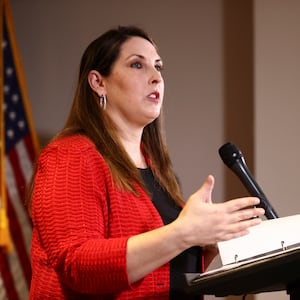When former Sen. David Perdue launched an aggressive Trump-backed challenge to Gov. Brian Kemp in Georgia, Kemp’s allies in Washington made an early commitment to go all-in to defend the incumbent from the MAGA onslaught.
The Republican Governors Association, the party’s official arm for governor’s races, wasted no time—nor spared any expense. For months, ads attacking Perdue were inescapable on Georgia airwaves.
In total, the RGA spent over $5 million in support of Kemp. It was an effort without precedent in GOP history, both in terms of dollars and in the fact that it had to be done at all.
But the return on that investment was clear: On Tuesday, Kemp trounced Perdue in Georgia’s gubernatorial primary.
The massive RGA cash dump, The Washington Post reported, is believed to have dealt a “devastating blow” to Perdue’s chances. Despite having Trump’s full backing—and millions of dollars of his campaign cash—Perdue limped to the finish line after running a listless campaign.
While the RGA’s involvement in the Georgia GOP drama has attracted the most attention—and might have the largest impact—Kemp is far from the only incumbent who has relied on the group’s help to make it through a primary fight.
The RGA also notched another win on Tuesday. Next door in Alabama, Gov. Kay Ivey—whom the group spent $2 million to defend—dispensed with her primary challengers. Because she received over 50 percent of the vote, Ivey will avoid a runoff and cruise to re-election in that deep-red state.
In the 2022 election cycle so far, the RGA has spent over $9 million in support of incumbents in Georgia, Alabama, Ohio, Idaho, and Oklahoma. The group has never had to spend this much to defend sitting governors from primary challengers—or anything close to it.
That’s because the GOP of 2022 is in a historically anti-establishment mood. Of the 15 governors up for re-election this year, eight have faced primary challenges. Almost all of those challenges have come from the MAGA wing of the party, either from candidates with Trump’s endorsement or the support of key figures in his movement.
No Republican incumbent has lost a primary thus far, and it’s possible that all of them could survive their challenges this year. But that sterling record won’t come without a cost for the GOP, which has far more ambitious goals this year than getting their incumbents out of primaries unscathed.
There are 18 states with competitive governor’s races this year, according to the Cook Political Report. With Democrats facing stiff political headwinds, Republicans are hoping to ride backlash to Joe Biden’s presidency to flip governorships in states like Nevada and Wisconsin while holding onto power in key battlegrounds like Arizona and Georgia.
But in some marquee races, GOP candidates could need serious help from the RGA: the Republican nominee in Pennsylvania, 2020 election denier Doug Mastriano, has raised around $1.5 million in total—less than a tenth the amount of his Democratic opponent, Josh Shapiro.
Republican leaders have been frank about how the need to spend heavily against MAGA-fueled primary challenges has undermined their ultimate goal of winning as many states as possible in November.
“This is just not the best use of our money. We would much rather use it just in races against Democrats,” former Gov. Chris Christie (R-NJ), who co-chairs a fundraising arm of the RGA, told the Post. “But it was made necessary because Donald Trump decided on the vendetta tour this year and so we need to make sure we protect these folks who are the objects of his vengeance.”
Jesse Hunt, a spokesperson for the RGA, said the group is “proud to work in support of our incumbent governors’ re-election efforts in 2022, each of whom will be re-elected for another four years.”
“Their accomplished records stand in stark contrast to the Democrat governors across the country who find themselves bogged down with personal scandals and failed agendas that will render them toxic with voters come November,” Hunt said.
But Democrats believe there’s no way for Republicans to get around the impact of the dollars that have gone out the door already.
Jared Leopold, a Democratic strategist who formerly worked at the Democratic Governors Association, said the RGA’s spending “takes a chunk out of what has been a historical advantage for Republicans on fundraising.”
“Every dollar they have to spend going on TV in Sioux Falls is a dollar they're not spending in Pittsburgh,” said Leopold. “Ultimately, there is no doubt that Donald Trump is the worst enemy of the RGA right now, and they are having to spend a lot of money to stop Donald Trump instead of attacking Democrats.”
When it comes to Trump’s vengeance, Kemp is the No. 1 objective. Next on that list is likely Ohio Gov. Mike DeWine, who the ex-president and the MAGA base have attacked for his implementation of measures to fight COVID-19.
But none of DeWine’s GOP challengers were able to mount a strong campaign against him, and with his super PAC armed with $1 million in RGA money, he defeated his closest rival by 20 points in the May 3 primary.
In Idaho, Gov. Brad Little did face a Trump-backed primary challenger: Lt. Gov. Janice McGeachin, a far-right figure with links to extremist militia groups. In the May 17 primary, Little defeated McGeachin by a wide margin. But the RGA spent nearly $100,000 to boost the incumbent governor, a sum that included an ad campaign on Fox News in the final days of the race.
In Alabama, Trump did not endorse any of the candidates challenging Gov. Kay Ivey, though the ex-president attacked Ivey because he blames her for scuttling a planned 2020 campaign rally in Alabama. One well-funded candidate, Lynda Blanchard, was Trump’s ambassador to Slovenia.
During the race, an organization called “Get Families Back to Work, Inc.” contributed $2 million to Ivey for the primary. That was RGA money; the group shares an address with the RGA and its listed officers are RGA employees, reported AL.com.
Ahead on the calendar, on June 28, Oklahoma Republicans will vote in what has become a contentious primary campaign, though it’s not predicated on Trump grievances.
There, Gov. Kevin Stitt is facing Joel Kintsel, the former head of the state’s Department of Veterans Affairs, who is basing his campaign on allegations of “cronyism” in Stitt’s office. Also in the running is Kevin Sherwood, a far-right candidate espousing MAGA rhetoric and COVID skepticism. In April, the RGA announced it reserved $577,000 in ads to back Stitt in the primary.
In two other states, the RGA is backing up incumbents who are running against fellow Republicans, though the circumstances are slightly different.
In Alaska, Gov. Mike Dunleavy is set to go up against Bill Walker, a former GOP governor of the state who is running this year as an independent candidate. The RGA has committed $3 million to back up Dunleavy in that race.
And in South Dakota, Gov. Kristi Noem is the heavy favorite against a very right-wing primary challenger who has gotten little traction. The RGA’s PAC sent $2 million to Noem’s campaign, a similar investment to incumbents who are not facing primaries, such as Gov. Ron DeSantis of Florida.
Democrats haven’t had to divert any of their resources this year to quell challenges from within the party. That’s a distinct advantage they enjoy over a Republican Party that has been fractured by Trump.
But that doesn’t mean Democrats haven’t had to spend heavily already this election cycle to avert disaster—even in traditionally safe territory for them.
Last year, when California Gov. Gavin Newsom was facing a recall campaign, the Democratic Governors Association had to pour $5.5 million into the Golden State to keep Newsom afloat. In November’s off-year elections, the DGA spent over $8 million to support Gov. Phil Murphy in New Jersey, helping him narrowly beat an unheralded GOP challenger.
Still, Republicans acknowledge that the constant threat of MAGA mutinies is a drag on their party—and is poised to be one for the foreseeable future.
Doug Heye, a longtime GOP strategist, said he believed that the RGA would end up having more than enough resources for November, despite having had to spend heavily to get their incumbents through the primary season.
“Obviously, they’d rather avoid the situation entirely,” Heye said. “It highlights why Republicans made a mistake to get in the business of Donald Trump, but that ship has sailed… That’s the political reality of where they are.”










